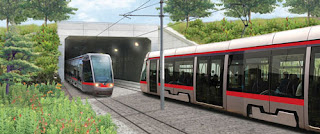There are all sorts of reasons for someone to take issue with Ottawa's current transit plan. You can pose questions about the cost. You can question the need for a tunnel at all. You can ponder the cost-benefit ratio of light-rail transit compared to bus rapid transit. All of these, in fact, have been questioned in the current election. But in doing so, you have to be fair in your comparisons and accurate in looking at the numbers behind the plan before reaching your conclusions. Otherwise, you're deceiving yourself, and if you're running for mayor, you're deceiving the people you hope will vote for you.
The most recent example of inaccurate comparisons has come in the aftermath of
the cancellation of NJ Transit's Trans Hudson Mass Transit Tunnel (also known as the ARC tunnel) project. As costs for the tunnel climbed at untenable rates, New Jersey governor Chris Christie decided (very controversially) that "[t]he only prudent move is to end this project" to at least contain the costs. And, of course, this made Ottawans nervous about our transit tunnel--for good reason, because tunnel projects to have a habit of exceeding their estimates. By a lot. And it's come up on the election trail, too, as Clive Doucet used the ARC tunnel example to support his argument for surface-rail through the city. From
CTV Ottawa:
While the numbers in Ottawa are smaller, one mayoral candidate predicts a similar story. Clive Doucet is for light rail but against the downtown tunnel.
"Typically tunnels run, on average, 60 per cent over," says Doucet. "So, say it's budgeted $2.1 billion … you're looking at $3 billion."
Fair enough, cautioning about costs for transit plans is prudent for someone running for public office. I'm not sure where the 60 per cent cost-overrun figure comes from, but it's entirely conceivable that Ottawa's tunnel could generate a number in that range, especially considering the
issues that have arisen with the University of Ottawa's excavation work for a new building on campus.
But it's important to be clear about such cautions. Doucet is projecting a 60 per cent overrun for the CAD2.1B price tag, but that's not the cost associated with a tunnel; that's the whole transit plan, including surface rail for the vast majority of the span. The actual tunnel portion is currently estimated at CAD735M, so even a 60 per cent cost overrun would bring that cost up to CAD1.176B, pushing the total project up to CAD2.541B overall. Which is definitely more than the city and citizens would prefer to pay, but certainly isn't enough to push the city into bankruptcy.
And comparing Ottawa's tunnel with the ARC tunnel project is a precarious comparison, at best. Ottawa's tunnel is to be a 3.2 km distance, under downtown Ottawa. The Trans Hudson project was a 5.6 km tunnel under the Hudson River. The
New York Times called the ARC tunnel "the largest transit project in the nation"; Ottawa's project is a rather humble starting point, in comparison. The class-D (+/- 25 per cent) cost estimate of Ottawa's tunnel is CAD735M, and the total project is $2.1B; the total initial cost estimate for the ARC tunnel was USD8.7B, which had climbed and was expected to end up between USD11-14B when all was said and done. Fairly big difference in scope between the projects.
For the last few weeks, Andy Haydon has been making claims about the inferiority of LRT compared to BRT, and cautioning that proceeding with the current plan could bankrupt Ottawa. Almost post-for-post, David Reevely has blasted holes through Haydon's claims, offering counter-points to Haydon's "
cherry-picked" facts and expanding the number of comparison cities to offer a more representative sample.
You expect mayoral candidates to enter a race running through plans with a very fine-toothed comb, simply as due diligence. And it's entirely possible that both Doucet and Haydon have sound arguments to support their alternative transit plans. But they're both hurting their arguments by presenting weak supporting "facts" or estimates for them.



